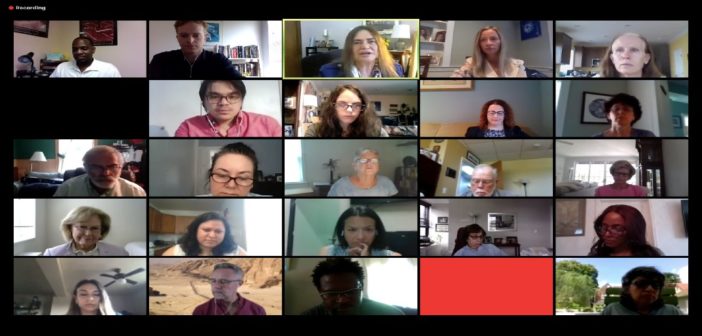When you hear something is “the bottom,” what do you imagine? The Bottom of the Barrel. Rock Bottom. Hopelessness.
At Wednesday’s Fordham University Annual Social Work Conference, opening speaker Warren Kent, M.S.W., vice president for community-based services at The Children’s Village, spoke about The Bottom.
“My father grew up in Richmond, Virginia, in a place called The Bottom,” he said. “How do you go through life and not think about the impact words have on an individual’s life?”
Kent related his father’s struggles to the ongoing racial disparities and injustices found in Westchester County and the rest of the United States. He reviewed some of the statistics, and one stood out the most: 14.6% of the population in Westchester is Black, but Black youth in foster care make up 57% of its caseload.
Then, Kent finished his address with a powerful question:
“Why did it take a person dying in front of everybody’s eyes for us to remember that Black lives matter, too?”
A Time of Crisis
The conference, titled “A Time of Crisis: Health and Wellness Across All Generations,” was organized by the Henry C. Ravazzin Center on Aging and Intergenerational Studies and the Children and Families Institute. In an address of her own, Dean Debra McPhee, Ph.D., spearheaded conversation by focusing on the intersection of two major crises at the forefront of our country right now: the fight against racial inequality, and the COVID-19 pandemic.
Discussion started with a panel of three staff members of the BraveLife Intervention (BLI), a federally-recognized collaboration between the Westchester County Department of Social Services, The Children’s Village, and Fordham University. BLI focuses on keeping youth engaged, empowered, and connected, while also making sure those who age out of foster care do not become homeless. The program’s effectiveness relies on the lived experience of its Peer-to-Peer (P2P) Navigators, who have been through the foster care system themselves, to relate to youth who need assistance.
“BraveLife consists of people who have been directly impacted by the system, helping to shape that system,” said Kaylene Quinones, L.M.S.W., Coordinator at BraveLife.
The panel also discussed the challenges P2P Navigators face when working with older guardians, including grandparents, who raise youth in foster care.
“There is a paradigm shift to invite young people to the table with professionals and give them a voice, not just a seat, at the table,” Quinones said. “Engaging youth is critical.”
Older Adults and COVID-19
Speakers Dr. Janna Heyman, Fordham’s Henry C. Ravazzin Chair and director of the Ravazzin Center, and Collette Phipps, L.M.S.W., also emphasized the importance of engagement across all generations – including youth, adults, and older adults. Many older adults have expressed fear and concerns going out in their community during the pandemic, since things as simple as going to the grocery store carry a risk of contracting COVID-19. This apprehension often forces them to stay home, alone and isolated, during a difficult time.
Heyman cited from a recent study that 39% of US adults reported COVID-19 has negatively affected their mental health. And, Phipps added, many of them don’t have a support system.
However, Phipps, a program coordinator of research and development at the Westchester County Department of Senior Programs and Services, said her organization combats social isolation through a telephonic program, TIPS INtouch. Through this service, students call and engage older adults at least once a week, asking them predictive questions for hospitalization, including: how are you feeling? Have you fallen in the past few days? Have your medications changed? Are you taking those medications on time?
And Phipps said every student always ends the phone call with the same question:
“Would you like to hear from me again?”
So far, the answers have been a resounding yes. This innovative outreach initiative continues to build support to help engage older adults and make a difference in their lives.
Scholar Presentations and Substance Abuse During Crises
Every year, the Ravazzin Center and Children and Families Institute offers scholarships to Fordham M.S.W. students who display an outstanding commitment to the social work profession. This year, six scholars were honored at the conference and presented their research through a poster symposium.
The scholars for the 2019-2020 academic year were Robin Price, Jacquie Brecher, Jenny Maldonado, Katrina Scolavino, Dania Lerman, and Elmer Malibiran. They presented on topics such as: Adolescents and Nonsuicidal Self-Injury, Adolescent Suicidality, Collaboration Between Social Workers and Lawyers, Gang Activity and Members, Bullying Victimization, and Healthcare During Pandemics.
To close the conference, Dr. Linda White-Ryan, assistant dean of student services at GSS, presented on substance abuse and its impact on individuals, families, and communities. She noted that substance abuse affects all generations, and that we must remember – addiction is a brain disease. A person who is addicted may have lost their ability to choose.
“The hallmark of an addictive disorder,” she said, “is the continued use of drugs, even in the face of devastating circumstances.”
In response, she said, a non-judgmental attitude when treating a substance abuser is crucial.
“We, as health care professionals,” White-Ryan said, “must be the light-bearers of hope.”
A Time for Change
White-Ryan made an important distinction toward the end of her presentation: substance abuse disorders are not new.
Neither is racial injustice.
Warren Kent made it clear that we cannot let this time slip away from us. We cannot forget about eradicating racial injustice in a couple months, when the next crisis comes up.
I believe his words serve well to end this article. In fact, they should be repeated again, and again, and again – to make sure we never forget.
“Why did it take a person dying in front of everybody’s eyes for us to remember that Black lives matter, too?”
“Why did it take a person dying in front of everybody’s eyes for us to remember that Black lives matter, too?”
“Why did it take a person dying in front of everybody’s eyes for us to remember that Black lives matter, too?”



